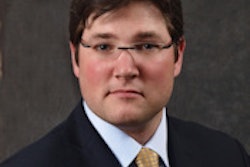A large California hospital network has ended a long-term contract with a Sacramento radiology group that provided it with imaging services for years. Industry watchers are wondering if the decision reveals a trend of hospitals playing hardball with radiology groups as power shifts away from radiology practices.
Last November, Sutter Health notified Radiological Associates of Sacramento (RAS) that it was going to let the existing contract between the two entities expire on March 31. And it did -- ending a relationship that began in 1922, according to Fred Gaschen, executive vice president of RAS.
"This is a power play on Sutter's part," Gaschen told AuntMinnie.com. "We did not want this to happen."
RAS is the largest private radiology group in Northern California, Gaschen said. Its 90 doctors provide diagnostic imaging, urology, medical oncology, vascular surgery, thoracic surgery, gynecologic oncological surgery, radiation oncology, and nuclear medicine services throughout the Sacramento region in 23 locations.
Sutter allowed the contract to expire because the two entities couldn't reach agreement, according to Dr. Cecilia Hernandez, director of medical affairs at Sutter Medical Center, Sacramento.
"Our goal is to improve quality, timeliness, and effectiveness of patient care -- and to make our services more affordable," she told AuntMinnie.com. "We need a radiology group closely aligned with us under this initiative and working toward it."
California has a restriction on the corporate practice of medicine that bans hospitals from employing physicians directly. One way a hospital can work with this restriction is to form a medical foundation that then acts as the physician employer. Sutter has done this, according to Hernandez.
"Sutter Medical Group is under the Sutter Medical Foundation, which hires our physicians," she said. "And Sutter Medical Group now has a division of medical imaging."
Sutter plans to have a full group of 21 radiologists in place in the hospitals RAS formerly served. Since April 1, it has hired 12 new doctors; in the meantime, it has also engaged Radisphere National Radiology Group of Beachwood, OH, to provide teleradiology services. RAS also provided Sutter with teleradiology, Hernandez said.
"We have a full radiology team now, composed of permanent and interim staff," she said. "We've had a lot of interest [from applicants]: They're looking for the opportunities for the level of collaboration and service we provide."
How will the termination affect RAS? Its radiologists will take a hit, Gaschen said.
"The bottom line is that our physicians are going to have less take-home pay," he said. "But we'll be fine. We're looking into a host of new business ventures, we have 16 outpatient imaging centers, and there's a lot of support in the independent medical community for us."
So far, no RAS radiologists have left the group for Sutter, according to Gaschen.
"Our radiologists understand that [in RAS] they get to practice how they want -- they own the practice," he said.
Bucking the trend
Contracts between hospitals and the radiology groups that serve them expire all the time. But in recent years, some hospitals have either allowed contracts to expire or have terminated contracts with longtime partners. Hospitals then hire or form new radiology groups to pick up the slack -- some say to have more control over imaging services.
In 2008, Florida Radiology Associates lost its contract with Florida Hospital of Altamonte Springs, which it had served since 1968. The hospital then formed its own radiology group, Radiology Specialists of Florida, which is owned and operated by Florida Hospital.
And last year, Mercy Health Partners in Toledo ended its contract with Consulting Radiologists Corporation (CRC) with 19 days notice, hiring Santa Monica, CA-based Imaging Advantage to provide radiology management and interpretation services. CRC had provided radiology services to three of Mercy's hospitals for more than 60 years.
How can radiologists buck the trend? It takes creative thinking, according to Steve Renard, president of Synergy Diagnostic Services of San Diego.
"Radiologists need to think about how to provide coverage 24/7 through internal call coverage or sharing night coverage between local groups," Renard said. "The more a group relies on teleradiology companies for weekend and overnight coverage, the more vulnerable they are. When radiology groups offer hospitals their own services, hospital administrators realize the importance of radiologists, not only to read exams but also to act as consulting physicians."
Local radiology groups can get involved in hospital committees and medical staff activities and can boost communication with other clinicians, according to Renard. And a bit of political proactive behavior can't hurt: Radiologists should get involved with the initiatives of professional organizations to protect the specialty in this era of healthcare reform.
In any case, the radiology landscape is changing, according to Gaschen.
"We're not the first [group to lose a contract with a hospital], and we won't be the last," he said. "People have forgotten that it's physicians who actually save lives. Somehow that focus has been lost, and radiology is becoming part of corporate medicine."
By Kate Madden Yee
AuntMinnie.com staff writer
April 22, 2010
Related Reading
Radisphere skirts local groups in bid for hospital contracts, April 15, 2010
Imaging Advantage creates uproar with new business model, July 9, 2009
Florida Hospital forms own radiology group, May 22, 2008
Teleradiology: A threat to local practices? April 22, 2008
California radiology group sues UnitedHealthcare over payment cuts, June 5, 2007
Copyright © 2010 AuntMinnie.com




















